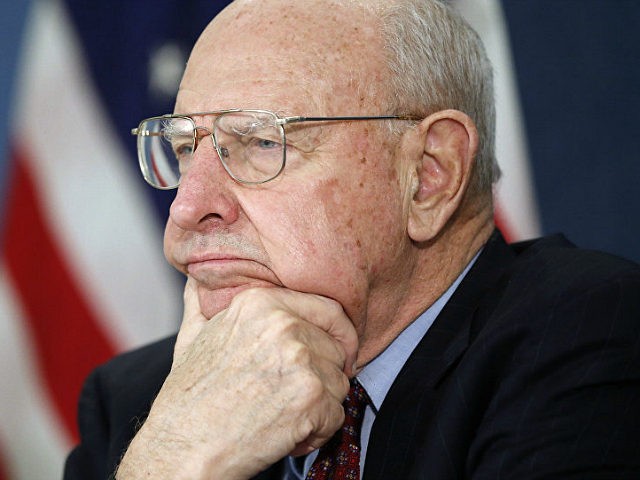The Clinton administration’s ambassador to Iran and the United Nations, Thomas Pickering, is under fire for failing to disclose his ties to Boeing while lobbying hard for the Iran nuclear deal. Since the deal went through, Boeing has been working on a $25 billion deal with Iran Air.
The Daily Beast reports that Pickering “has been quietly taking money from Boeing while vocally supporting the Iran nuclear deal — testifying before Congress, writing letters to high-level officials, and penning op-eds for outlets like The Washington Post.”
In an email to the Daily Beast, sent from his Boeing corporate email account, Pickering confirmed he was a Boeing employee from 2001 to 2006, and a consultant from 2006 through the end of 2015. The problem is that the Beast could find no evidence that he disclosed that relationship to Congress or the media while he was pushing the Iran nuclear deal.
“The fact that Pickering did not regularly disclose his relationship with Boeing — which, as is now obvious, had a massive financial interest in the implementation of the Iran nuclear agreement — has drawn criticism from government transparency advocates, who consider it to be a violation of ethical standards,” writes Betsy Woodruff at the Daily Beast, duly noting that such relationships have been kept quiet in other major policy debates, such as advocates for Syrian military intervention failing to disclose their ties to defense contractors.
Blame could be laid at the feet of the media for failing to research Pickering and bring his Boeing ties to the attention of news consumers, since his consulting position wasn’t exactly a secret, and he was such a prominent advocate of the Iran deal.
More troubling is that Pickering did not list his ties to Boeing on the disclosure form he submitted to the House Armed Services Committee before testifying; it is not mentioned in the official biography filed with the House of Representatives; and it was not disclosed on the letter supporting the Iran deal he signed with other former diplomats — a letter that was not only widely touted by the media but cited by the White House.
There is some amusement to be found in the spectacle of this administration — normally so eager to discredit its opponents by claiming their positions are shaped by nefarious, undisclosed financial interests — treating Pickering’s ties to Boeing as a trifle. A scientist who ate lunch on an oil company’s dime cannot talk about global warming honestly, but Boeing consultants have no conflict of interest when pushing major foreign policies that will benefit their employers to the tune of $25 billion, just for starters?
The Iran deal remains a partisan battleground, with the State Department applauding Boeing’s sale to Iran Air, while critics such as Rep. Pete Roskam (R-IL) are warning that Iran could use those planes to ferry its troops and weapons — the sort of activity that brought U.S. sanctions against Iran Air in 2011, until the nuclear deal erased them.
“The decision to sell militarily-fungible products to terrorism’s central supplier is just plain wrong. I will do everything in my power to stop it,” Roskam wrote in a June 21 USA Today editorial.
“It’s tragic to watch such an iconic American company make such a terribly short-sighted decision. If Boeing goes through with this deal, the company will forever be associated with Iran’s chief export: radical Islamic terrorism. The U.S. Congress will have much to say about this agreement in the coming days,” Roskam added, in a statement to Fox News on Thursday.
Publicly, the administration says it believes commercial agreements like the Boeing deal will lead to liberalization in the Iranian theocracy — a theory that remains eternally popular, despite the dearth of evidence that it has worked with other repressive regimes across the world. Privately, the administration is perpetually worried that Iran will walk away from the nuclear deal after pocketing the billions Obama has already given them.
One of the pretexts Iran mentions on a fairly regular basis is that Obama promised them big money, not just the theoretical opportunity to engage in more international commerce. This threat has already produced the bizarre spectacle of U.S. Secretary of State John Kerry hawking Iran to European investors, like the host of a late-night infomercial for the world’s leading sponsor of terrorism.
The Boeing-Iran Air deal is seen as crucial to observers like National Iranian American Council President Trita Parsi, who explained it to the Daily Beast as follows:
Parsi added that Boeing’s tentative agreement to sell planes to Iran Air will be critical to the success of the Iran nuclear agreement. If Boeing and Iran Air can finalize and successfully implement the multibillion-dollar sale, it will be easier for other American companies to do business with Iran, he said. On the other hand, if criticism from political leaders and the public makes completing the deal too politically costly for Boeing, then other companies will be unlikely to follow its lead. And if that happens, then Iran’s sanctions relief will be in word only—the country won’t benefit from the U.S. decision to lift some sanctions, and that could disincentivize its leaders from holding up their end of the agreement.
“If the Iranians end up de facto not getting sanctions relief, the deal will collapse,” he said. “That’s right now the biggest threat to the sustainability of the deal.”
None of that was part of the Obama administration’s sales pitch for the Iranian nuclear deal, but as we’re learning on a weekly basis, there’s a lot they didn’t tell us, and a great deal of what they did tell us wasn’t true.

COMMENTS
Please let us know if you're having issues with commenting.